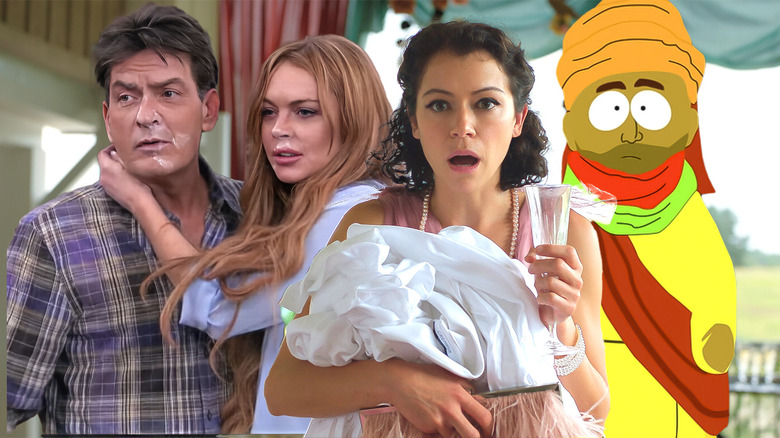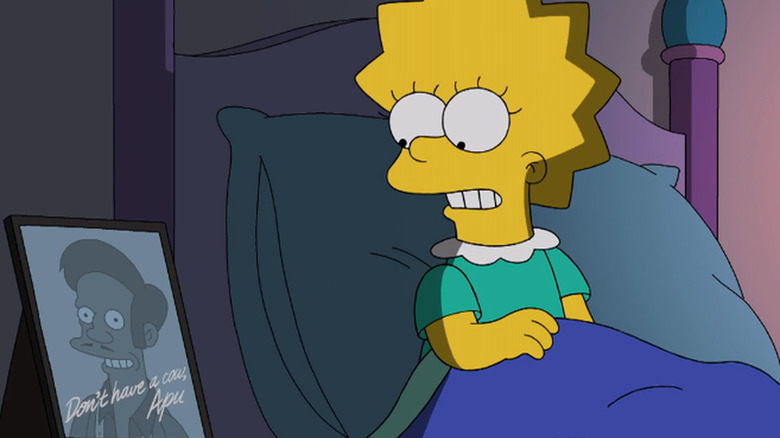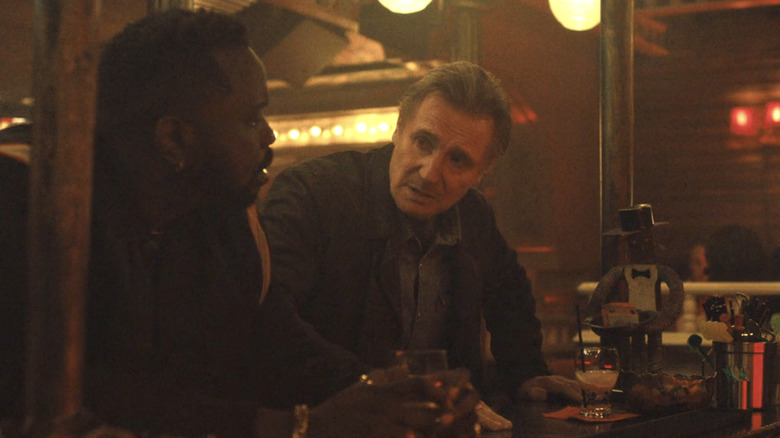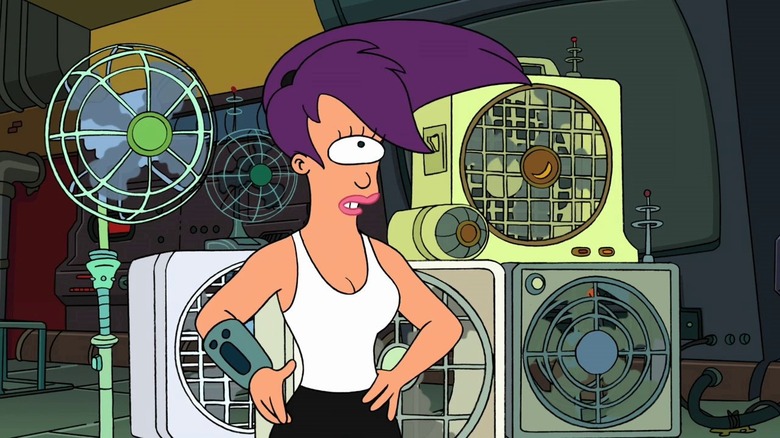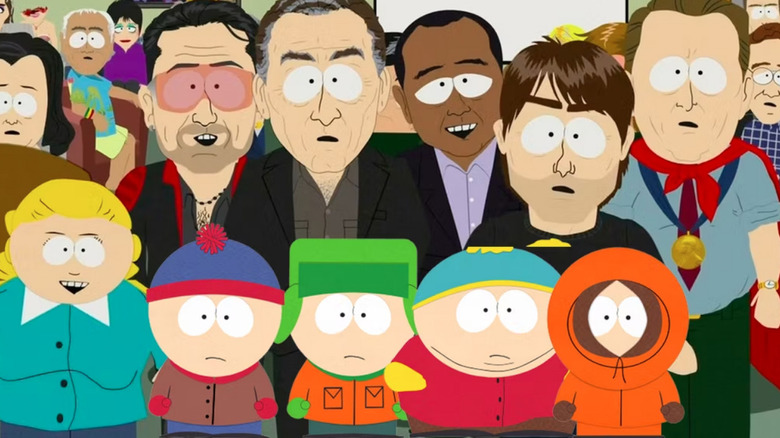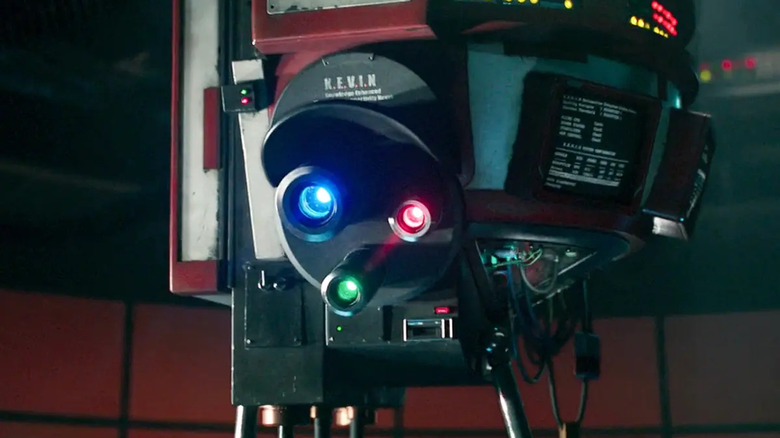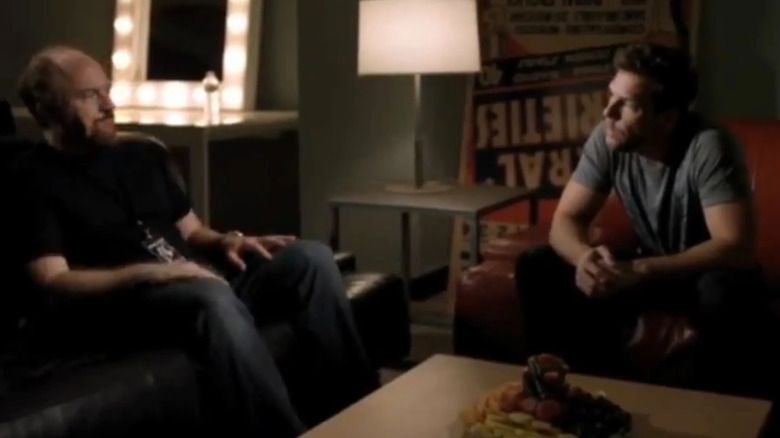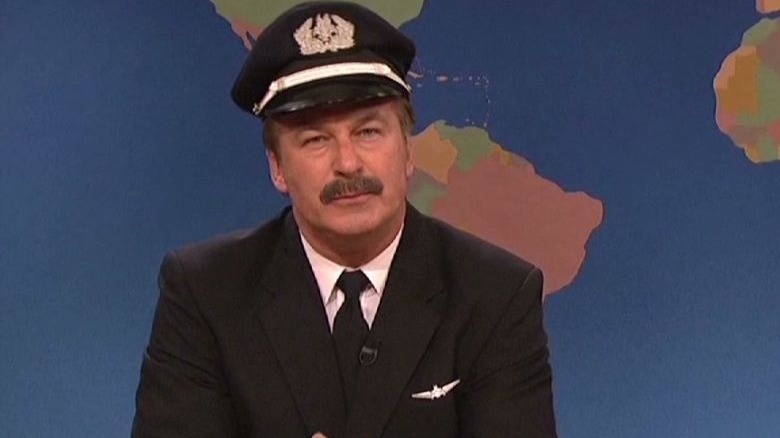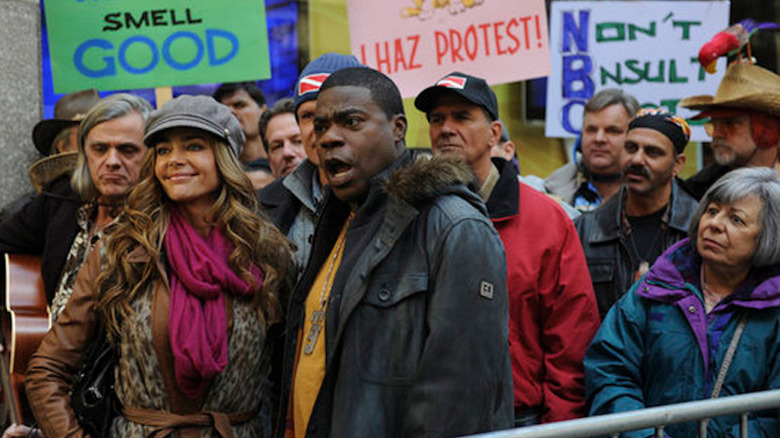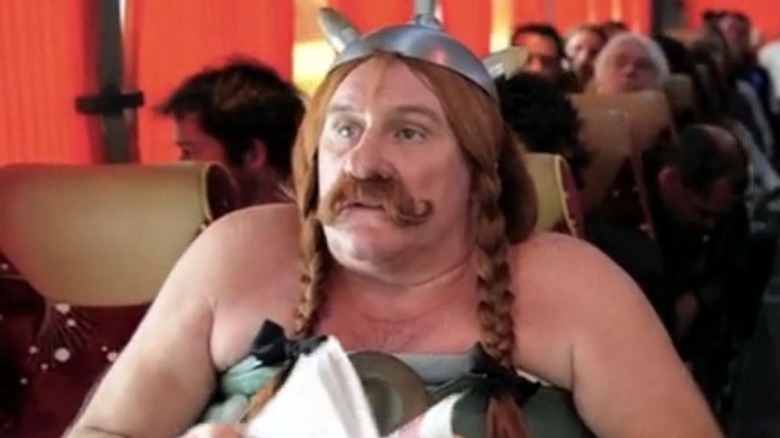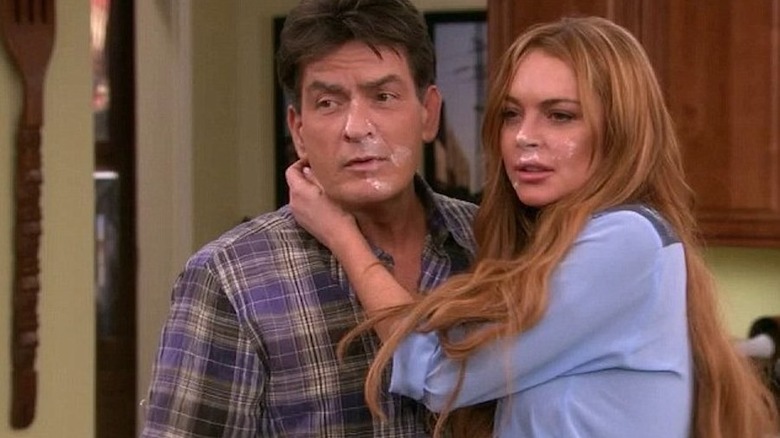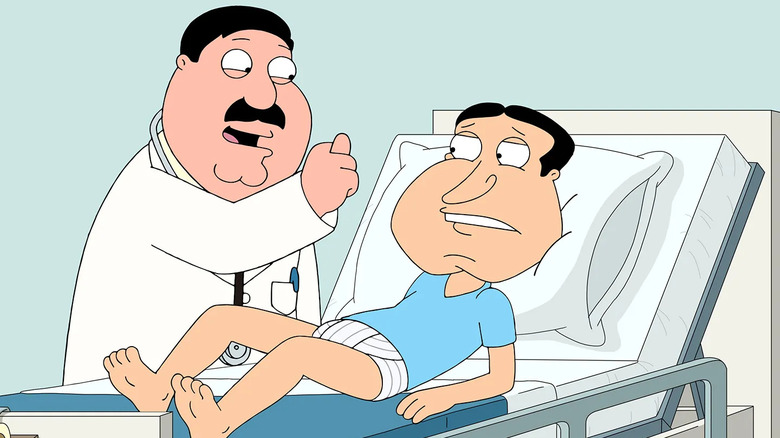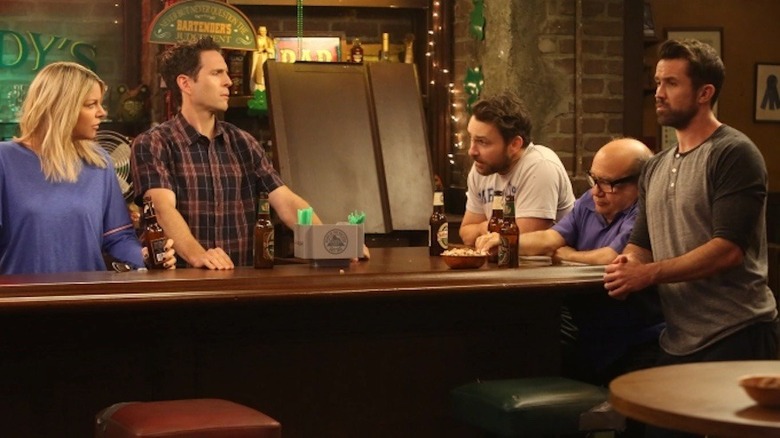Real Life Controversies That Were Addressed On Screen
If there's anything audiences find more captivating than the adventures of their favorite on-screen heroes, it's the personal lives of the people who play them. In fact, in Hollywood, there are probably more juicy stories behind the camera than in front of it, with so much gossip that it's become an industry unto itself (just check out our sister-site NickSwift to see what we mean).
But some stars want more than to appear in the back pages of a gossip rag after being swept up in a drug scandal, or after being caught making offensive comments on a hot mic. Sometimes they go further and address the controversy on-screen. Poking a little bit of fun at themselves, they can use a healthy dose of introspection and self-deprecating humor as a way of accepting responsibility for bad behavior or letting the audience know that they're well aware of the gravity of their transgression. When a public apology isn't enough, these stars can spin their scandals into material for their own TV shows and movies. From animated offenses to real-life racism, we've found 12 times that actors have taken their personal controversies and addressed them on screen.
The Simpsons' awkward response to Apu
In eras past it wasn't uncommon for racial stereotypes to permeate pop culture, and that included "The Simpsons," which introduced Apu Nahasapeemapetilon, an Indian convenience store clerk in 1990. In 2017, filmmaker Hari Kondabolu released "The Problem with Apu," a documentary that points out the many issues with the depiction of the character, from harmful cliches to the fact that he was voiced by a White actor, Hank Azaria.
Though Matt Groening first tried to deal with the controversy himself, "The Simpsons" later decided to address it on-screen. In the Season 29 episode, "No Good Read Goes Unpunished," Marge is reading a storybook to Lisa that sparks a discussion about political correctness. After making a half-hearted attempt to make sense of the changing standards in society, Marge blithely concludes that the issue "will be dealt with at a later date." To which Lisa responds, "If at all," while looking directly at the audience, while a framed photo of Apu sits by her bedside.
Unfortunately, the show's attempt to confront the issue only made the situation worse, drawing criticism for its indifference, and from Kondabolu himself. Unable to do much with the character in the wake of the controversy, the show opted to retire Apu permanently. Azaria took accountability for his part in reinforcing culturally insensitive attitudes towards Indians through Apu while appearing on Dax Shepard's podcast, "Armchair Expert," whose co-host, Monica Padman, is an Indian-American: "I really do apologize. I know you weren't asking for that but it's important."
Liam Neeson went to Atlanta to confront racism
Liam Neeson has found himself at the center of a couple of controversies thanks to his stance on guns. In 2015, he came out staunchly in favor of gun control, which saw political pundits pointing out the hypocrisy of an actor who makes a living off of violent action movies. Things only got worse in 2019 when he relayed an apparently true story from his past. According to Neeson, a member of his family had once been the victim of a sexual assault and he briefly harbored a violent revenge fantasy that saw him walk the streets with a firearm hoping for the opportunity to kill a Black person.
Needless to say, Neeson's racist admission sparked a media firestorm, and he attempted an apology, calling his thoughts from 40 years earlier unacceptable and taking responsibility for his hateful comments. But in 2022, Neeson went further, appearing in a Season 3 episode of Donald Glover's acclaimed series, "Atlanta," where he tackles the 2019 scandal head-on. In the scene, he sits at a bar called The Cancel Club, where he meets Brian Tyree Henry's character, Paper Boi, and has a conversation about his past comments.
In a tongue-in-cheek scene, the fictional version of Neeson admits to being racist, albeit this time in an attempt to shame him over his comments. As it happens, Neeson — who was initially reluctant to appear — was convinced to cameo in the show by Glover's friend, Jordan Peele.
Futurama took a jab at its own cancelation
In 1999, Matt Groening released the hysterical sci-fi comedy, "Futurama," and it's been a bumpy ride for the series ever since. Never quite gaining the popularity of Groening's other smash hit, "The Simpsons," "Futurama" has become a cult favorite that's found itself canceled more than once, only to be revived on a new network. This includes its unceremonious dumping in 2003, with the Fox Network giving the series the ax before it was resurrected by Comedy Central several years later. And on its return, the revived series poked fun at the controversial cancelation that had caused an uproar among diehard fans.
In the opening scene of the TV movie, "Bender's Big Score," the crew of Planet Express is told by Professor Farnsworth that they'd been fired years before by the delivery network, "Box." A cutaway gag sees the Box Network's sign on the fritz, revealing "Fox Network," whose executives are portrayed as "brainless drones" and "asinine morons." Philip Fry is stunned to learn that they'd been canceled, but within moments, Farnsworth receives a phone call and learns that they're not just back in business, but "back on the air," which is good news for the crew and their "many fans." And with that, the robot Bender declares triumphantly, "We're back." Customarily self-referential, it's a typical "Futurama" gag and one that we may see again when the series returns on Hulu in late 2023.
South Park confronts censorship in real time
Launched in 1997 and created by Trey Parker and Matt Stone, "South Park" continually pushes the boundaries of what is acceptable on television, often butting right up against the line of censorship and repeatedly finding itself the subject of controversy as a result. The show's long history of offending people finally came to a head in a two-part episode in 2010, where just about every celebrity came forward to sue the town of "South Park" for slandering them.
This includes Tom Cruise, Al Gore, Rosie O'Donnell, and Jared Fogle, all of whom had been lampooned by the series in the past. But the biggest controversy it addressed was the show's depiction of the Muslim deity, Muhammad. Earlier episodes of the series had depicted the character on-screen, but in the intervening years, fictional depictions of Muhammad had drawn widespread condemnation from Muslim extremists. In Season 14's "200," "South Park" planned to depict Muhammad once more, sparking threats of violence against the show and its network. Stone and Parker were essentially daring Comedy Central to stop them, which they ultimately did.
In the end, Comedy Central chose to cover the character with a black box containing the word "CENSORED." This too sparked another wave of controversy as the subject of censorship became a hot-button issue. Easily the best controversy of their own to be addressed on-screen, it's become a landmark moment in the history of TV censorship.
A robotic Kevin Feige broke the fourth wall in She-Hulk
Marvel Studios has been one of the most remarkable success stories in the history of Hollywood. Starting in 2008 as an independent film studio, they came out of the gate with "Iron Man" and haven't looked back, cranking out blockbuster smash hits en route to being bought by Disney in 2009. But they haven't been without criticism, and in recent years they've been targeted by disappointed fans who feel their visual effects work has suffered, and that some of their CGI characters haven't been up to par.
Most notably, when "She-Hulk: Attorney at Law" released its first trailer, its all-CGI version of the character was roundly roasted by fans. Well, Marvel didn't ignore the issue, not content to simply improve the CGI ahead of the show's release. Instead, it seems they turned it into a joke at the climax of Season 1's finale episode, where She-Hulk breaks out of the confines of her own series and enters the "real world" and confronts the head of the studio, "Kevin."
But instead of being greeted by the upbeat real-life studio president, Kevin Feige, She-Hulk meets an artificially intelligent robot, K.E.V.I.N. (Knowledge Enhanced Visual Interconnectivity Nexus), who makes all the decisions for the MCU. But before he'll talk to She-Hulk about her issues with her own show, K.E.V.I.N. demands she turns back into her human alter-ego — that requires no CGI — and to do it off-screen because she's "very expensive" to animate.
Dane Cook confronted his beef with Louis C.K.
In 2017, Louis C.K. was caught up in one of the biggest scandals in Hollywood when he was hit with allegations of sexual misconduct, and perhaps surprisingly, the comedian admitted to his despicable behavior. But that's not the controversy that he addressed in his FX series, "Louie," which ended years before the scandal surfaced. Instead, it was a long-standing feud between himself and fellow stand-up, Dane Cook.
The beef began in 2005 when fans of both comics noticed that some jokes Cook told on his 2005 album resembled those told by C.K. years earlier. Though he seemed to agree with the joke theft, by 2011, even C.K. was tired of hearing about it. So he decided to clear the air between himself and Cook and used his show — where he plays a fictionalized version of himself — to do it.
The scene is set backstage at a comedy club, where the fictional C.K. confronts Cook with accusations that he'd used his jokes in his routine. The two air their honest grievances, with Dane frustrated by how the allegations ruined what should have been a joyous time in his career, and C.K. expresses annoyance at his refusal to admit that he may have even unknowingly stolen his material. It's a heartfelt scene, but ironically, C.K. himself has said that it could have been better if only he'd listened to Cook's ideas for the scene.
Alec Baldwin mocked himself on SNL
Like Louis C.K., Alec Baldwin's biggest controversy isn't the one he spoofed on television. The "30 Rock" star, who came under investigation for the on-set shooting death of cinematographer Halyna Hutchins on the set of the film "Rust," has been mired in controversy of one sort or another for years. From a verbally abusive voicemail that he left his daughter to assaulting a photographer, the actor's notoriously fiery demeanor has gotten him in trouble more than once.
In 2011, though, Baldwin was back in trouble again for more bad public behavior. This time it was a spat with American Airlines, who removed him from a plane after refusing a flight attendant's order to stop playing a game on his phone while they were preparing for takeoff. Back in the news cycle, Baldwin vented about the confrontation on Twitter, which only seemed to make things worse.
But just a week later, Baldwin showed up on "Saturday Night Live" to mock the incident, appearing as part of the show's "Weekend Update" segment. Baldwin, dressed as the plane's pilot, was there to issue a fictional public apology to himself, on behalf of the airline. Maybe Baldwin meant the sketch as a self-deprecating dig at his own ego, or maybe he was genuinely attempting to jab at the airline for giving him the boot. Either way, it seems to have done its job, as the sketch was a hit with critics, and the furor seemed to abate thereafter.
30 Rock went meta for Tracy Morgan's gaffe
Set at the real-life 30 Rockefeller Plaza which "Saturday Night Live" has called home for nearly 50 years, "30 Rock" is a meta sitcom about the behind-the-scenes goings-on at a fictional sketch comedy show. As a result, the series has a penchant for poking fun at real-life scandals, from politics to Hollywood gossip, and beyond. But when "SNL" alum and series star, Tracy Morgan, got into hot water after going on a bigoted rant targeting the LGBTQ community in June of 2011, the show's creator, Tina Fey, decided to lampoon her own co-star.
In the Season 6 episode, "Idiots are People Too!," Morgan's character Tracy Jordan — a thinly veiled parody of Morgan already — tells a series of anti-gay jokes at a comedy club, and comes under fire. He tries to make amends but bungles every attempt at an apology, and his boss, Liz Lemon (Fey), decides to speak out on his behalf. As if addressing the audience at home directly regarding Morgan's real-life comments, Liz assures everyone that "he's not capable of hate, he's just an idiot." For his part, Morgan himself issued a public apology long before the episode aired. Like her on-screen counterpart, Fey too was forced to comment on the scandal in real life, remarking that she hoped her co-star was sincere, if not for his sake, then for his gay and lesbian co-workers at NBC.
Gérard Depardieu addressed an old scandal
Though he hasn't been a big name stateside for years, Gérard Depardieu remains an icon in his native France. If you do remember him, though, it might be for his role as Reynaldo in Kenneth Branagh's 1996 adaptation of "Hamlet," or Ridley Scott's biopic of Christopher Columbus, "1492: Conquest of Paradise," or 1990's "Cyrano de Bergerac" for which he was nominated for an Academy Award.
If you follow the gossip columns, though, you may also know him for an infamous in-flight incident that made headlines in 2011. Unlike Alec Baldwin, however, Depardieu didn't lose his temper, but his bladder control, allegedly urinating on the floor of the plane before takeoff while heavily inebriated. After a failed attempt to make it to the restroom, flight attendants had told him to remain seated during pre-flight prep, and the actor simply couldn't hold his horses.
Depardieu was a good sport about the whole situation, making light of it less than a month later. Showing humility, the actor released a short parody video where he made fun of the scandal, showing himself — dressed as the cartoon character, Obélix, who he's played in a series of feature films — aboard a plane and succumbing to a craving for some wild boar meat. But when told to remain seated as the plane is preparing for departure, Depardieu gets comically upset, though he never resorts to any urination.
Charlie Sheen and Lindsay Lohan joked about their pasts on Anger Management
Countless actors have fallen victim to the allure of drugs and alcohol during their careers, as addiction has destroyed the lives of far too many in Hollywood. Those that do manage to recover are often forced to endure the media fallout, and two of the most highly publicized survivors — love them or hate them — are controversial actors Charlie Sheen and Lindsay Lohan.
In 2012, Sheen began starring in the sitcom, "Anger Management," in which he plays Dr. Charles "Charlie" Goodson, a washed-up baseball player who has become an anger management therapist. The show's second season features the aptly titled episode, "Charlie Gets Lindsay Lohan Into Trouble," in which the actress plays herself, and hires Charlie to be her therapist. While spending time together, things get playful, and both their faces wind up covered in powdered sugar in one scene, and a lurking paparazzo snaps photos that make it seem far worse than it really is.
Some might say the humorous sitcom moment helped to humanize the notorious pair, while others might groan at the obvious joke. Regardless, it was an easy way to confront their past mistakes, letting the audience know that they're both well aware of the public's perception of them.
Family Guy gave Quagmire a #MeToo moment
Debuting in 1999, "Family Guy" might be 10 years younger than "The Simpsons," but it has still managed to amass an astonishing 21 seasons and counting — and that includes a two-year gap in the mid-2000s when it was briefly canceled. But with such a long run comes the inevitability that some of its jokes outlive their appropriateness. The biggest offender in that department is Glenn Quagmire, the show's resident pervert, who has long been controversial, to say the least.
Bordering the edges of good taste even in the late '90s, Quagmire's aggressively lecherous behavior toward women was far beyond the pale in the era of #MeToo, and "Family Guy" creator Seth Macfarlane wanted to own up to that fact. In 2018, producers announced an entire episode written about Quagmire that would make an honest attempt to examine the history of both the character and the show's treatment of sexual assault. "We're trying to be pretty fair about the whole history of the character," writer Rich Appel told reporters during San Diego Comic-Con. "Seth encouraged us, and even took a special interest while we were writing the episode."
But whether because they were unhappy with the results of the finished product, or were worried about potential fall-out, the episode has never seen the light of day. Since that time, though, the series has mostly addressed the controversy by simply moving away from the character's more disgusting traits.
It's not always sunny in Philadelphia
Another series with a lengthy run, "It's Always Sunny in Philadelphia" has been on the air since 2005, and is in production on its 16th season as of this writing. Like "Family Guy" and "The Simpsons," it too faced controversy over a previous episode that hasn't aged well — in this case, a 2010 installment titled "Dee Reynolds: Shaping America's Youth." In this story, the gang performs their own version of a hypothetical "Lethal Weapon" sequel, and regrettably, it turns the character of Mac into Danny Glover's Roger Murtaugh and puts star Rob McElhenny in blackface.
Even worse, a later episode uses the same gag, as they made yet another sequel, "Lethal Weapon 6," and once again used blackface to turn Mac into Murtaugh. Since those two episodes aired, though, streaming service Netflix has pulled them both from its site due to the controversy, and McElhenney addressed the issue, awkwardly admitting that they'd gone too far.
But acknowledging their mistakes in a statement wasn't enough for them, and in a 2021 episode, "The Gang Makes Lethal Weapon 7," they make a third sequel to the buddy comedy classic, and they don't shy away from the unfortunate history. The gang openly admits that the use of blackface was a big mistake and this time they simply hire a black actor — you know, the thing they should have done all along.
